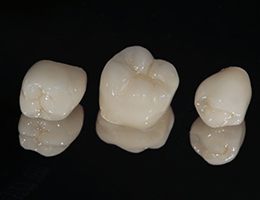Dental Crowns – Ann Arbor, MI
Repairing Damaged Teeth Without Drawing Attention to Them
Some patients hear that a tooth is damaged and immediately panic because they feel getting it restored will ruin the appearance of their entire smile. In order to help his patients continue feeling comfortable letting their grins show, Dr. James Olsen custom crafts each of his dental crowns in Ann Arbor, MI from high-quality materials that can be customized to seamlessly blend in with the rest of a smile. Using the latest dental technology, including the iTero digital impression system, he’s able to create strong, long-lasting, and precisely fitted dental crowns that help improve his patients’ oral health and confidence.
What are Dental Crowns?

A dental crown is a tooth-shaped “cap” that is placed on top of a prepared damaged tooth in order to restore its original shape, size, and appearance. They can be made of a variety of materials, but most patients prefer to have them crafted from natural-looking and customizable dental porcelain or ceramic. The procedure of getting a dental crown in Ann Arbor typically takes place over the course of two appointments, so your restoration can be customized to fit your exact and unique needs. Once Dr. Olsen has placed your crown, you can expect to regain the function of your damaged tooth and restore the appearance of your smile.
Why Do You Need to Get a Dental Crown?

Many people aren’t aware that crowns can be used for much more than simply repairing a broken tooth in Ann Arbor. These restorations are a great solution for a wide variety of problems, including:
- Severe decay that can’t be treated with a dental filling.
- Forced dental trauma that has caused a tooth to become cracked or broken.
- Root canal therapy that has treated an infected tooth that now requires additional strength and protection.
- Fixed bridges, which hold replacement teeth in place with two dental crowns on either end.
What is the Process of Getting a Dental Crown?

Before we schedule your appointment for a dental crown, our team of professionals will ensure that you have all of the information you need to feel comfortable and confident that this restoration is the best choice for your oral health. The procedure itself typically takes place over the course of two appointments to our dental office. It can be broken down into the following timeline:
Before you leave our dental office, we’ll provide you with some maintenance instructions and let you know what you can do to ensure that your crown lasts. With regular brushing and flossing paired with semi-annual checkups and cleanings, you should be able to get the most out of your restorations.
Understanding the Cost of Dental Crowns

If you have a tooth that’s been damaged, you don’t necessarily need to worry about kissing it goodbye. Dr. James Olsen offers dental crowns in Ann Arbor to build up and protect your compromised tooth while improving its appearance. During your consultation with us, we can discuss the cost of your restoration in detail. Until then, here are some things to take into consideration.
Factors That Affect the Cost of Dental Crowns

There are several different factors that can contribute to the cost of your new restoration. Here are the main ones to take into consideration:
- Severity of Damage: If your tooth has been significantly damaged, a dental crown may not be enough to restore it on its own. You may need other treatments as well. For example, if your tooth is decayed and infected, you may need to undergo root canal treatment before you receive your dental crown. The cost of any additional treatments should be considered as well.
- Materials Used: Dental crowns can be crafted from many different materials. At our practice, we use porcelain and ceramic because of their durability and the way they mimic the appearance of natural tooth enamel.
Does Dental Insurance Cover Dental Crowns

If deemed medically necessary for the health of your smile, a dental crown will generally receive some coverage from your insurance provider. Every plan is different, but most consider a dental crown to be a “major restorative procedure,” meaning that approximately 50% of the treatment is covered after the annual deductible has been met. It is best to check with your provider ahead of time so that you don’t run into any surprises. Our team is happy to handle the entire claim process on your behalf to help you get the most out of your coverage. If you have any questions regarding your plan, feel free to reach out!
Options for Making Dental Crowns Affordable

If you don’t have dental insurance, this doesn’t mean that you are completely out of luck. We are happy to accept payments through CareCredit – a third-party financing company that can split the cost of your treatment into manageable monthly installments with little to no interest. To learn more about your financial options, don’t hesitate to reach out to one of our friendly team members.
Dental Crown FAQs

We believe that you should never undergo a dental treatment unless you fully understand how it works. That’s why we’ve provided you with the answers to some of the questions about dental crowns in Ann Arbor that we get asked the most often. While this page should give you a good idea of what to expect before, during, and after getting a dental crown, don’t be afraid to contact our office if you have any further questions.
Does Getting a Dental Crown Hurt?
Before preparing the tooth to receive the crown, our team will administer a local anesthetic to that part of your mouth. You may feel a slight pressure during the procedure, but you shouldn’t experience any pain. In fact, it’s about as comfortable as getting a filling.
When we switch out your temporary crown for your permanent restoration, your tooth may hurt for a few seconds when it’s exposed to the air. However, this should last less than a minute. Additionally, you might be sore for a few days after getting your crown placed. Taking over-the-counter pain medications as needed should be more than enough to alleviate your discomfort.
What Are Dental Crowns Made Of?
Dental crowns can be made from a variety of materials. In the old days, they were most often made from metals like gold or silver, but most dentists currently use dental porcelain. This material is not only sturdy enough to withstand the daily pressures of chewing, but it can be color-matched to blend in with your adjacent teeth. It resembles tooth enamel extremely closely; it even reflects light in the exact same way!
How Long Will My Dental Crown Last?
On average, you can expect your crown to last for 10-15 years, but you can extend its lifespan to 20 years or even more by taking excellent care of it. Essentially, this involves treating it like it’s one of your natural pearly whites. Brush and floss on a daily basis, and visit us for checkups and cleanings at least twice a year. Wear a mouthguard during sports games and practices to protect your crown and teeth from injury. Lastly, avoid biting or chewing anything particularly hard with your crowned tooth.
How Much Do Dental Crowns Cost?
The cost of your dental crown will vary depending on what material it’s made of and where in your mouth it’s being placed. The good news is that in most cases, dental insurance companies count crowns as a restorative procedure, so they typically cover up to 80% of the cost. For patients without dental insurance, we can help you apply for CareCredit to let you finance the care your smile needs without breaking the bank.

